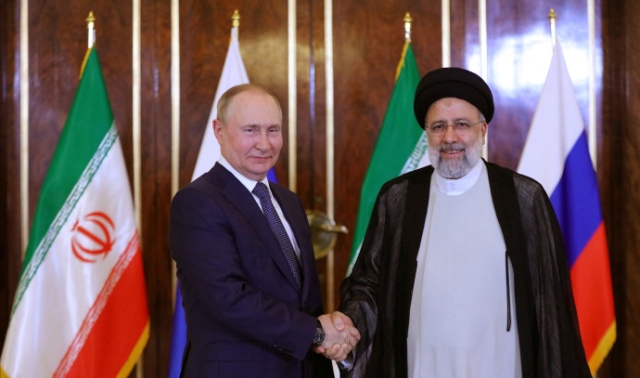According to reports circulating in Arab media outlets, a source within the Quds Force of the Iranian Revolutionary Guards disclosed a new agreement on Monday afternoon, signed between Iran and Russia. In this agreement, Hezbollah, Iran's proxy terrorist organization in Lebanon, is set to transfer its outdated weaponry to local Arab tribes in Syria and the Russian army. In exchange, Hezbollah will receive a fresh supply of weapons from Tehran.
It has also been reported that Moscow will acquire a portion of Hezbollah's weaponry to fulfill its ammunition needs in the ongoing conflict in Ukraine. These revelations, initially published by the Qatari newspaper "Al-Jarida," cite sources claiming that Russia, faced with a critical shortage of ammunition for its operations in Ukraine, will gain access to a substantial stockpile of ammunition that Hezbollah has been accumulating in its warehouses since 2006.
Iran is preparing a deal to transfer weapons to Hezbollah for Russia and Arab tribes in Syria, threatening Israel and Ukraine
— 🇮🇱 🇺🇦 Knukli (@11Knuk123) October 3, 2023
Kuwaiti publication Al-Jarida, citing a source in the Quds Force of the Iranian Islamic Revolutionary Guard Corps.https://t.co/jxrp7CSd5J
This Tehran-Moscow agreement plays a significant role in facilitating efforts to forge a new understanding between Turkey and Syria. The foundation of this potential accord rests on Damascus's commitment to eliminate Kurdish factions from the Turkish border and extend this removal up to 45 kilometers within Syrian territory.
Notably, the Kurdish SDF forces, backed by the United States, stand as the primary obstacle to the realization of these arrangements. In light of this challenge, Ankara, Tehran, and Moscow all share a common interest in avoiding direct confrontation with Washington. Consequently, they have jointly devised a strategy involving the arming of Arab tribes with outdated Hezbollah equipment to carry out the mission of eliminating the SDF.
Furthermore, an Iranian source has revealed that "Hezbollah Secretary General Hassan Nasrallah conveyed to Iranian General Qa'ani during their meeting in Lebanon that the conflict with Israel has entered a new phase. Consequently, Hezbollah requires high-quality weaponry capable of deterring Israel." It's worth noting that Tehran has committed to an agreement with Moscow that would ensure the secure transfer of these weapons, minimizing the risk of Israeli Air Force attacks.
An article in Al-Jarida has claimed that #Iran is seeking to create a complex deal in #Syria to transfer weapons from #Hezbollah to Syrian regime-backed Arab tribes and also to send arms to #Russia.https://t.co/e3C5cphGuc
— Jason Brodsky (@JasonMBrodsky) October 2, 2023
These reports have emerged on the heels of Syrian state television announcing Israeli Air Force strikes on military positions in the vicinity of Deir Ez-Zor in eastern Syria. An official within the Syrian army confirmed these airstrikes and reported injuries to two soldiers as well as property damage. Sources affiliated with the Syrian opposition, including the Syrian Observatory for Human Rights, have asserted that the targeted sites belonged to pro-Iranian militias.


